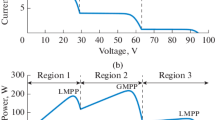Abstract
This paper presents the design of a controller for Maximum Power Point Tracking (MPPT) of a photovoltaic system. The proposed controller relies upon a Recurrent Neuro-Fuzzy (RNF) which is designed as a combination of the concepts of Sugeno fuzzy model and neural network. The controller employs the RNF of four-layer with sixty-four fuzzy rules. Moreover, for the proposed RNF an improved self-tuning method is developed based on the photovoltaic system and its high performance requirements. The principal task of the tuning method is to adjust the parameters of the Fuzzy Logic (FL) in order to minimize the square of the error between actual and reference output. Simulations with practical parameters show that our proposed MPPT using RNF outperform the conventional MPPT controller terms of tracking speed and accuracy.
Access this chapter
Tax calculation will be finalised at checkout
Purchases are for personal use only
Similar content being viewed by others
References
Luque, A., Hegedus, S.: Handbook of Photovoltaic Science and Engineering, 2nd edn. Wiley, Hoboken (2010)
Sick, F., Erge, T.: Photovoltaic in Building. International Energy Agency, Paris (1996)
Enrique, J.M., Andujar, J.M., Bohorquez, M.A.: A reliable, fast and low cost maximum power point tracker for photovoltaic applications. Sol. Energy 84, 79–89 (2010). https://doi.org/10.1016/j.solener.2009.10.011
Hohm, D.P., Ropp, M.E.: Comparative study of maximum power point tracking algorithms. Prog. Photovolt. Res. Appl. 11(1), 47–62 (2003). https://doi.org/10.1002/pip.459
Esram, T., Chapman, P.L.: Comparison of photovoltaic array maximum power point tracking techniques. IEEE Trans. Energy Convers. 22(2), 439–449 (2007)
Dileep, G., Singh, S.: Maximum power point tracking of solar photovoltaic system using modified perturbation and observation method. Renew. Sustain. Energy Rev. 50, 109–129 (2015). https://doi.org/10.1016/j.rser.2015.04.072
Messalti, S., Harrag, A., Loukriz, A.: A new neural networks MPPT controller for PV systems. In: Proceedings of the Renewable Energy Congress (IREC) (2015). https://doi.org/10.1109/irec.2015.7110907
Chekired, F., Mellit, A., Kalogirou, S., Larbes, C.: Intelligent maximum power point trackers for photovoltaic applications using {FPGA} chip: a comparative study. Sol. Energy 101, 83–99 (2014). https://doi.org/10.1016/j.solener.2013.12.026
Lyden, S., Haque, M.: Maximum power point tracking techniques for photovoltaic systems: a comprehensive review and comparative analysis. Renew. Sustain. Energy Rev. 52, 1504–1518 (2015). https://doi.org/10.1016/j.rser.2015.07.172
Bendib, B., Belmili, H., Krim, F.: A survey of the most used {MPPT} methods: conventional and advanced algorithms applied for photovoltaic systems. Renew. Sustain. Energy Rev. 45, 637–648 (2015). https://doi.org/10.1016/j.rser.2015.02.009
Radjai, T., Gaubert, J.P., Rahmani, L., Mekhilef, S.: Experimental verification of po MPPT algorithm with direct control based on fuzzy logic control using CUK converter. Int. Trans. Electr. Energy Syst. 25(12), 3492–3508 (2015). https://doi.org/10.1002/etep.2047
Radjai, T., Rahmani, L., Mekhilef, S., Gaubert, J.P.: Implementation of a modified incremental conductance {MPPT} algorithm with direct control based on a fuzzy duty cycle change estimator using dspace. Sol. Energy 110, 325–337 (2014). https://doi.org/10.1016/j.solener.2014.09.014
Dounis, A.I., Kofinas, P., Alafodimos, C., Tseles, D.: Adaptive fuzzy gain scheduling PID controller for maximum power point tracking of photovoltaic system. Renew. Energy 60, 202–214 (2013). https://doi.org/10.1016/j.renene.2013.04.014Technicalnote
Chekired, F., Larbes, C., Rekioua, D., Haddad, F.: Implementation of a {MPPT} fuzzy controller for photovoltaic systems on FPGA circuit. Energy Proc. 6, 541–549 (2011). https://doi.org/10.1016/j.egypro.2011.05.062
Messai, A., Mellit, A., Pavan, A.M., Guessoum, A., Mekki, H.: FPGA-based implementation of a fuzzy controller (MPPT) for photovoltaic module. Energy Convers. Manag. 52(7), 2695–2704 (2011). https://doi.org/10.1016/j.enconman.2011.01.021
Larbes, C., Cheikh, S.A., Obeidi, T., Zerguerras, A.: Genetic algorithms optimized fuzzy logic control for the maximum power point tracking in photovoltaic system. Renew. Energy 34(10), 2093–2100 (2009). https://doi.org/10.1016/j.renene.2009.01.006
Cheng, P.-C., Peng, B.-R., Liu, Y.-H., Cheng, Y.-S., Huang, J.-W.: Optimization of a fuzzy logic-control-based MPPT algorithm using the particle swarm optimization technique. Energies 8(6), 5338–5360 (2015). https://doi.org/10.3390/en8065338
Lin, W.-M., Hong, C.-M., Chen, C.-H.: Neural-network-based MPPT control of a standalone hybrid power generation system. IEEE Trans. Power Electron. 26(12), 3571–3581 (2011). https://doi.org/10.1109/TPEL.2011.2161775
Liu, Y.-H., Liu, C.-L., Huang, J.-W., Chen, J.-H.: Neural-network-based maximum power point tracking methods for photovoltaic systems operating under fast changing environments. Sol. Energy 89, 42–53 (2013). https://doi.org/10.1016/j.solener.2012.11.017
Hatti, M., Meharrar, A., Tioursi, M.: Power management strategy in the alternative energy photovoltaic/PEM fuel cell hybrid system. Renew. Sustain. Energy Rev. 15(9), 5104–5110 (2011). https://doi.org/10.1016/j.rser.2011.07.046
Boumaaraf, H., Talha, A., Bouhali, O.: A three-phase {NPC} grid-connected inverter for photovoltaic applications using neural network {MPPT}. Renew. Sustain. Energy Rev. 49, 1171–1179 (2015). https://doi.org/10.1016/j.rser.2015.04.066
Kulaksız, A.A., Akkaya, R.: A genetic algorithm optimized ANN-based {MPPT} algorithm for a stand-alone {PV} system with induction motor drive. Sol. Energy 86(9), 2366–2375 (2012). https://doi.org/10.1016/j.solener.2012.05.006
Ramaprabha, R., Gothandaraman, V., Kanimozhi, K., Divya, R., Mathur, B.: Maximum power point tracking using GA-optimized artificial neural network for solar PV system. In: Proceedings of the Electrical Energy Systems (ICEES), pp. 264–268 (2011). https://doi.org/10.1109/icees.2011.5725340
Chaouachi, A., Kamel, R.M., Nagasaka, K.: A novel multi-model neuro-fuzzy-based {MPPT} for three-phase grid-connected photovoltaic system. Sol. Energy 84(12), 2219–2229 (2010). https://doi.org/10.1016/j.solener.2010.08.004
Villalva, M.G., Gazoli, G.R., Filho, E.R.: Comprehensive approach to modeling and simulation of photovoltaic arrays. IEEE Trans. Power Electron. 24(5), 1198–1208 (2009). https://doi.org/10.1109/TPEL.2009.2013862
Zhang, Y., Sen, P., Hearn, G.E.: On-line trained adaptive neural controller. IEEE Control Syst. 15(5), 67–75 (1995). https://doi.org/10.1109/37.466260
Tey, K.S., Mekhilef, S.: Modified incremental conductance algorithm for photovoltaic system under partial shading conditions and load variation. IEEE Trans. Ind. Electron. 61(10), 5384–5391 (2014). https://doi.org/10.1109/TIE.2014.2304921
Koutroulis, E., Blaabjerg, F.: A new technique for tracking the global maximum power point of PV arrays operating under partial shading conditions. IEEE J. Photovolt. 2(2), 184–190 (2012). https://doi.org/10.1109/JPHOTOV.2012.2183578
Author information
Authors and Affiliations
Corresponding author
Editor information
Editors and Affiliations
Rights and permissions
Copyright information
© 2018 Springer Nature Switzerland AG
About this paper
Cite this paper
Douiri, M.R., Douiri, S.M. (2018). Global Maximum Power Point Tracking Based on Intelligent Approach for Photovoltaic System Under Partial Shading Conditions. In: Castro, F., Miranda-Jiménez, S., González-Mendoza, M. (eds) Advances in Soft Computing. MICAI 2017. Lecture Notes in Computer Science(), vol 10632. Springer, Cham. https://doi.org/10.1007/978-3-030-02837-4_14
Download citation
DOI: https://doi.org/10.1007/978-3-030-02837-4_14
Published:
Publisher Name: Springer, Cham
Print ISBN: 978-3-030-02836-7
Online ISBN: 978-3-030-02837-4
eBook Packages: Computer ScienceComputer Science (R0)




